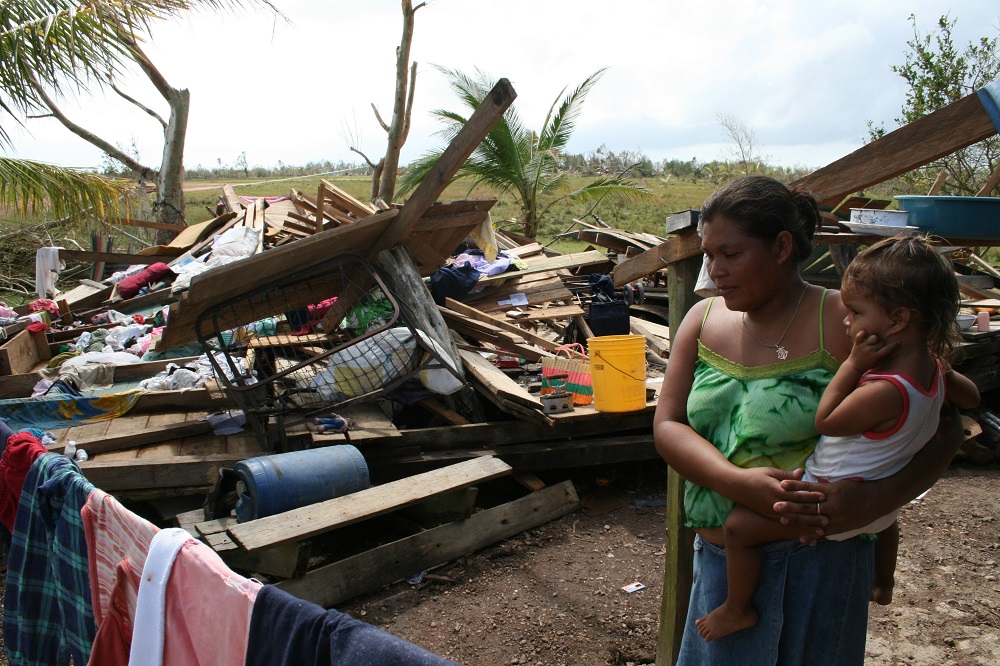
Platform on Disaster Displacement
Key Messages for COP26
Increasing Action and Support to Better Avert, Minimize and Address Displacement Related to the Adverse Effects of Climate Change
THE CONTEXT
Large-scale movements of people, driven by a number of factors including climate change, affect regions across the world. Countries and communities most vulnerable to climate change such as Small Island Developing States (SIDS) and Least Developed Countries (LDCs) are particularly impacted. Displacement related to the adverse effects of climate change should in principle be averted or minimized, unless it is life-saving (e.g. evacuations). It creates humanitarian challenges, affects human rights, undermines development and may, in some situations, affect human security.
The Platform on Disaster Displacement (PDD) supports the implementation of the United Nations Framework Convention on Climate Change (UNFCCC) and the Paris Agreement, including the work of the Warsaw International Mechanism for Loss and Damage Associated with Climate Change Impacts (WIM) and its Task Force on Displacement (TFD). The need for robust action and support is evidenced by the best available science, which tells us that we are already living in a climate emergency.
With little time left until COP26, billions around the world look to their leaders to make the bold & courageous decisions necessary to finally implement the Paris Agreement. We cannot let them down.
– Patricia Espinosa, Executive Secretary of the United Nations Framework Convention on Climate Change
Climate change is an existential threat for island states. Stronger political will at the international level is needed to combat climate change and ensure the safety and livelihoods of Pacific and other island communities.
– Anare Leweniqila, Deputy Permanent Representative of the Republic of Fiji to the UN and Chair of the Platform on Disaster Displacement
OUR KEY MESSAGES FOR COP26
In the context of the climate emergency and the increased risk of displacement related to the adverse effects of climate change, the PDD Steering Group’s Working Group on Climate Change developed a set of four key messages relevant for COP26. PDD Steering Group members, other States and all relevant Stakeholders are invited to consider and use them as they deem appropriate when preparing for and participating in the various proceedings and events at COP26.
1. Scale Up Action and Support to Avert, Minimize and Address Displacement Related to the Adverse Impacts of Climate Change
One of the most challenging consequences of a changing climate is the impact on human mobility.
Millions of people are displaced as a result of disasters linked to natural hazards, the majority of which are weather-related; in the absence of immediate action to combat climate change, many millions more could be compelled to move.
Many countries, especially those that are particularly vulnerable to the adverse effects of climate change, such as Small Island Developing States (SIDS) and Least Developed Countries (LDCs), are already reaching the point at which existing approaches to climate change adaptation and disaster risk reduction will prove insufficient without stronger commitments to address climate change.
To scale up action and support to avert, minimize and address displacement related to the adverse impacts of climate change means:
- Ensuring full implementation of the 2015 Paris Agreement’s temperature goal;
- Increasing ambitions in Nationally Determined Contributions (NDCs) and National Adaptation Plans (NAPs), and stepping up actions to reach the adaptation goals of the Paris Agreement;
- Helping people affected by disasters to move out of harm’s way in safety and with dignity, including through planned relocation, supported by integrated climate change adaptation and disaster risk measures;
- Addressing the protection and assistance needs of people displaced in the context of the adverse effects of climate change, including developing durable solutions that anticipate future climate impacts.
Ultimately, robust and ambitious mitigation efforts must be accompanied by a shift towards increased support for adaptation, and more action and support to address loss and damage—including displacement—to respond to situations when adaptation is no longer possible.
2. Recall and Reiterate Support for Implementation of the WIM Executive Committee Recommendations on Integrated Approaches to Avert, Minimize and Address Displacement Related to the Adverse Effects of Climate Change
COP24 (December 2018) in Katowice, Poland, welcomed the recommendations of the Executive Committee of the WIM based on the work of the TFD. The 2018 Recommendations:
- Cover a wide range of actions to be taken by Parties and other stakeholders to better understand and address climate-related displacement risk and to be better prepared to respond to disaster displacement challenges;
- Include measures to facilitate migration or planned relocation as ways to adapt to the adverse effects of climate change.
It is recommended to highlight the importance of implementing the 2018 Recommendations, by:
- Recalling the relevance and importance of the 2018 Recommendations on integrated approaches to averting, minimizing and addressing displacement related to the adverse impacts of climate change from the Executive Committee of the WIM (10/CP.24).
- Encouraging further engagement and support of Parties and other stakeholders for the plan of action of the TFD and work on human mobility under strategic workstream (d) of the five-year rolling workplan of the WIM.
3. Support Operationalization of the Santiago Network for Loss and Damage
The Santiago Network for Loss and Damage (SNLD) was established during the COP25 2019 in Madrid, Spain, as part of the WIM. Its function is to catalyze the technical assistance of relevant organizations, bodies, networks and experts for the implementation of relevant approaches at the local, national and regional level in developing countries that are particularly vulnerable to the adverse effects of climate change.
The effective operationalization of the SNLD represents an important opportunity for increased action and support, better coordination and enhanced policy coherence, both under and outside of the UNFCCC. The effective operationalization of the SNLD can be facilitated by:
- Ensuring support and operationalization of the Santiago Network for Loss and Damage at COP26.
- Encouraging organizations, networks and experts working on displacement, migration and planned relocation to join the SNLD.
4. Increase Access to Sustainable and Predictable Climate Financing to Avert, Minimize and Address Displacement Related to the Adverse Impacts of Climate Change
Financing climate change action is a challenging issue and an area that needs to be addressed.
Climate finance is needed for mitigation, but it is equally important for adaptation and loss and damage.
The challenge of supporting developing countries to access finance to address climate change-related displacement needs to be approached comprehensively.
Increasing access to sustainable and predictable financing to avert, minimize and address displacement related to the adverse impacts of climate change means:
- Increasing access to and support for financing for adaptation and loss and damage for developing countries;
- Facilitating and increasing access to funding for loss and damage from the Green Climate Fund for the development of funding proposals related to the workplan of the WIM and the TFD Plan of Action;
- Recognizing the urgent need to scale up action and support, mobilize resources and develop innovative financing mechanisms from both public, private and alternative sources to implement integrated, effective, risk-informed and human rights-based approaches to displacement related to the adverse impacts of climate change.
Cover photo: © IFRC




